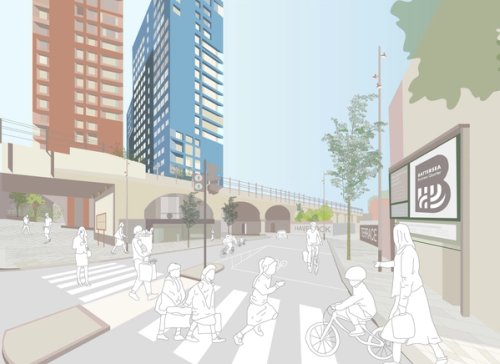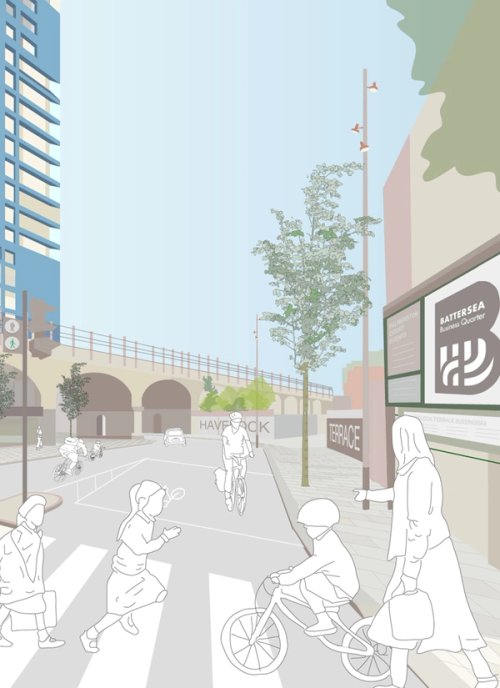Building circular industries while restoring riverside ecology in Newham
05 November 2025
The London Growth Plan recognises the central role innovation in existing industries will play in meeting the cities net-zero targets whilst supporting inclusive, sustainable growth. We Made That, together with Useful Projects, Steer and Cushman Wakefield, have been working with London Borough of Newham in Canning Town and Cody Road on the practical steps to realise the industrial area’s potential within the wider Thames Estuary industrial innovation corridor.
With over 11,000 homes coming forward in the immediate surroundings, the riverside industrial area must work harder in the coming years to become an integrated piece of the city. Whilst the area can offer these new neighbourhoods access to expansive riverside spaces, local jobs and amenites, this growth could also put pressure on the area’s ability to continue functioning effectively as a place of industry.

We were tasked with finding the right balance between these factors, creating significant benefits for local businesses and communities whilst allowing nature to thrive. Whilst these challenges are particularly acute in London, they are not unique to the city. Industrial areas have often consolidated next to rivers and present opportunities to improve access to green space for residents and workers whilst co-evolving with nature.
There are also opportunities to work with businesses to be more efficient with resources. With many construction, manufacturing, and waste businesses, the area has strong potential for circular business models—key to ensuring inclusive growth, as highlighted in Newham’s Community Wealth Building Strategy, Just Transition Plan and the London Growth Plan.
The Canning Town Enterprise Hub will support a network of businesses to play a central role in Newham and East London’s transition to a green and inclusive economy through:
- Growing the role of the area as a hub for green innovation and inclusive employment opportunities
- Improving infrastructure to support sustainable and active travel for local businesses and residents
- Creating an inclusive public realm that supports healthy lives and enhances local uses
- Restoring spaces for nature that are a part of the everyday experience of living and working in the area
- Kick-starting an economy that avoids wasted resources and keeps materials at their highest value
Through this project:
30,000m2 of industrial floorspace planned for creation including co-location with homes
30+ priority projects identified through local business engagement to deliver the vision for a circular economy
1.3km new and improved green corridors prioritised
2km new and improved cycling infrastructure identified
500m new walkway unlocked along the River Lea

Workshop with Canning Town and Cody Road local businesses exploring circularity opportunities
Whilst we explored intensification in its conventional sense – creating more employment space in industrial areas to make best use of land – we also identified how existing connections between businesses can be supported and amplified and how the natural environment can recover its complexity.
Through engaging with local business and organisations the team highlighted the potential for more circular supply chains, facilitating specific opportunities for sharing, reuse and recycling, whilst also identifying key barriers that the council and its partners must address. These networks have also Identified where partners can work together to restore the riverside ecology; creating new areas of habitat, adapting maintenance regimes to allow nature to thrive, and creating greener, cooler spaces for people to move through.
Conversations with businesses and organisations looking to create more circular business models also raised interesting questions on the future of the city’s employment land uses. Whilst policies that incentivise more intensive use of land are critical, they can also come into conflict with the need for ‘baggy’ yard based activities.
Open storage, material sorting and waste management are all vital to supporting circular use of materials with minimal need for transportation, particularly for the construction industry. With policies that incentivise increasing plot ratios how do we plan proactively for the re-use infrastructure that London will need to deliver circularity at scale? How is this coordinated between boroughs and with London’s neighbouring authorities? How do we ensure these industries create well paid, secure jobs that local people have the skills to access?
Policies that steer industrial intensification have been driven by managing the difference in land values between residential and employment uses, particularly in London. In addition to setting out the guidance to manage this process, our work in Canning Town and Cody Road is a realistic plan to transition to a circular economy and, creating good green jobs whilst co-evolving with nature over the long term.
The council is taking the next steps to deliver the projects within the framework. It is working to secure funding to deliver key green infrastructure projects, formalising business networks and undertaking more detailed design work on key sites.






